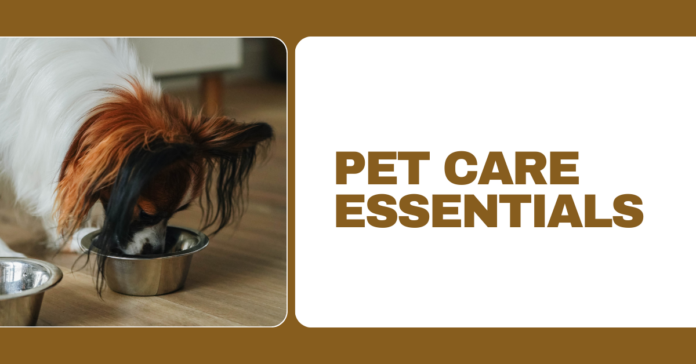Introduction
Pets bring joy, companionship, and love into our lives, but they also require careful attention and care. Proper pet care ensures that your furry friends live long, healthy, and fulfilling lives. This article provides essential tips for pet owners, covering various aspects of pet care, including nutrition, grooming, training, and health care.
Understanding Your Pet’s Needs
Different Species, Different Needs
Each type of pet has unique needs and requirements. Understanding your pet’s specific needs—whether it’s a dog, cat, bird, or reptile—is crucial for providing the best care. Researching their breed, temperament, and lifestyle requirements will help you create a nurturing environment.
The Importance of Socialization
Socializing your pet is vital for their mental health and behavior. Exposing them to different environments, people, and other animals can help reduce anxiety and aggression. Start socialization early, especially with puppies and kittens, to ensure they grow into well-adjusted adults.
Nutrition: Fueling Your Pet’s Health
Choosing the Right Diet
Selecting a high-quality diet tailored to your pet’s age, breed, and health status is essential. Consult with your veterinarian to determine the best food options for your pet. Pay attention to the ingredients, ensuring that they receive the right balance of proteins, fats, carbohydrates, vitamins, and minerals.
Feeding Guidelines
Establish a regular feeding schedule and portion control to maintain your pet’s healthy weight. Avoid overfeeding and provide appropriate treats in moderation. Always have fresh water available for your pet to stay hydrated.
Understanding Special Dietary Needs
Some pets may have specific dietary requirements due to allergies, sensitivities, or health issues. Work closely with your veterinarian to address these needs and make necessary adjustments to their diet.
Grooming: Keeping Your Pet Clean and Comfortable
Regular Grooming
Regular grooming is essential for maintaining your pet’s hygiene and comfort. Depending on the breed, your pet may require different grooming frequencies. Brushing helps reduce shedding and prevent matting, while bathing keeps their coat clean.
Nail Trimming and Ear Cleaning
Regular nail trimming is crucial to prevent discomfort and potential injury. Keep an eye on your pet’s ears and clean them as needed, especially for breeds prone to ear infections. Consult your veterinarian for guidance on the best grooming practices for your specific pet.
Dental Care
Oral health is often overlooked but is vital for your pet’s overall well-being. Regular dental check-ups, tooth brushing, and providing dental chews can help prevent dental diseases and maintain healthy gums.
Training: Building a Strong Bond
Positive Reinforcement Techniques
Training your pet using positive reinforcement techniques is effective and fosters a strong bond between you and your pet. Rewarding desired behaviors with treats, praise, or playtime encourages them to repeat those actions.
Basic Commands
Teaching basic commands, such as “sit,” “stay,” and “come,” is essential for your pet’s safety and well-being. Consistency and patience are key when training your pet. Short, fun training sessions will keep them engaged and motivated.
Addressing Behavioral Issues
If your pet exhibits undesirable behaviors, such as barking, chewing, or aggression, consult a professional trainer or behaviorist. Early intervention can help address these issues before they become ingrained habits.
Health Care: Keeping Your Pet in Top Shape
Regular Veterinary Check-ups
Regular veterinary visits are crucial for maintaining your pet’s health. Routine check-ups allow for early detection of potential health issues, vaccinations, and preventive care. Follow your veterinarian’s recommendations for check-up frequency based on your pet’s age and health status.
Vaccinations and Preventive Treatments
Ensure your pet receives the necessary vaccinations to protect them from common diseases. Additionally, discuss preventive treatments for parasites like fleas, ticks, and heartworms with your veterinarian.
Monitoring Health and Behavior
Stay vigilant about changes in your pet’s behavior, appetite, or energy levels. Any significant changes may indicate health issues that require veterinary attention. Keeping a close eye on your pet’s health can lead to early intervention and better outcomes.
Creating a Safe and Stimulating Environment
Safe Living Spaces
Create a safe environment for your pet by removing potential hazards, such as toxic plants, chemicals, and small objects that can be swallowed. Ensure that your home is pet-proofed to prevent accidents and injuries.
Enrichment Activities
Provide mental stimulation and physical activity through enrichment activities. Toys, puzzle feeders, and interactive games can keep your pet engaged and prevent boredom. Regular exercise is essential for your pet’s physical health and can reduce behavioral problems.
Quality Time Together
Spend quality time with your pet to strengthen your bond. Engage in play, training, and simply being present with them. Building a strong relationship will contribute to their overall happiness and well-being.
Conclusion
Caring for a pet requires commitment, love, and knowledge. By understanding your pet’s unique needs, providing proper nutrition, grooming, training, and health care, you can ensure a happy and fulfilling life for your furry companion. Remember that every pet is different, and building a strong bond through attentive care will create a rewarding experience for both you and your pet.
